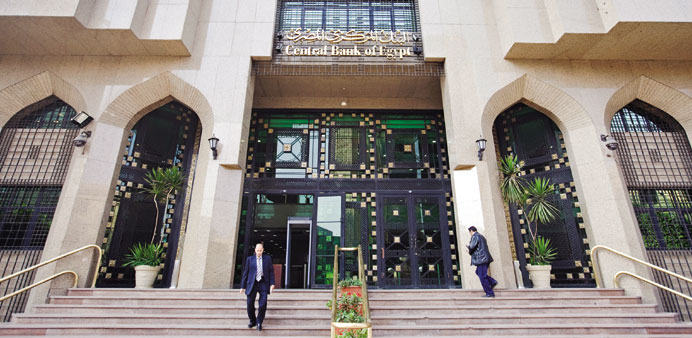Pedestrians use the stairs outside of Egypt’s central bank in Cairo. Egypt came under increased pressure to cheapen the pound after China’s surprise yuan devaluation in August. Foreign reserves of the most populous Arab state fell the most in almost four years in September, the same month the country announced its current account deficit had ballooned to $12.2bn, the biggest gap in central bank data going back to 2000.
Bloomberg/Cairo
Egypt depreciated the pound for the third time this year after the nation’s foreign reserves tumbled and the currency fell to a record in black-market trading.
The pound fell 1.3% to 7.9301 per dollar after the country’s central bank devalued it by the same margin at a regular dollar sale to local lenders, according to prices compiled by Bloomberg. That takes the currency’s decline for the year to 9.8%. Twelve-month non-deliverable forwards for the pound slumped 3.6%, the most on a closing basis in almost two months, to 10.3 per dollar as of 2.05pm in Cairo.
Egypt came under increased pressure to cheapen the pound after China’s surprise yuan devaluation in August fuelled declines across emerging-market currencies as they sought to preserve competitiveness of their exports. Foreign reserves of the most populous Arab state fell the most in almost four years in September, the same month the country announced its current account deficit had ballooned to $12.2bn, the biggest gap in central bank data going back to 2000.
Devaluation “was becoming more expected given the toll that maintaining an overvalued currency was taking on the economy,” said Jason Tuvey, London-based Middle East economist at Capital Economics. “A move closer to the black market rate would, in our view, start to restore Egypt’s external competitiveness. But it’s difficult to see for how long and how far the central bank will allow the pound to fall.”
The move comes a day after Finance Minister Hany Kadry announced the government is in talks with the World Bank for $3bn of loans to support the budget and ease the dollar shortage. Black market currency dealers in Cairo and Alexandria on average were charging 8.204 pounds per dollar yesterday, according to a Bloomberg survey. That reflects the weakest pound since the poll was started in April 2013.
Government spending helped boost economic growth to 4.1% in the fiscal year that ended in June - the fastest expansion since 2010. Still, non-oil private business activity contracted in six of the first nine months of 2015, according to the Emirates NBD Purchasing Managers’ Index.
Egypt can’t allow a sudden depreciation of the pound to its fair value because that would have a negative impact on almost 90% of Egyptians, Central Bank governor Hesham Ramez said in an interview published in Al Shorouk newspaper yesterday. Almost half of the population lives below or near the poverty line, according to a World Food Program study.
Ramez added that Egypt’s government prefers to complete its economic reform programme before seeking a loan agreement from the International Monetary Fund. Foreign reserves fell almost 10%, the most since January 2012, in September to $16.3bn. That covers less than three months of imports, compared with almost nine months before the 2011 uprising that drove President Hosni Mubarak from office.
The pound’s implied exchange rate, calculated using the differences of home and abroad shares of Egypt’s three most traded companies, fell 0.2% to 8.6682 per dollar, according to data compiled by Bloomberg.

